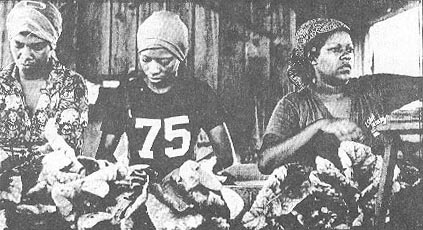
In order to make proletarian socialist revolution in the U.S., there must be unity among the multi-national proletariat. There must be revolutionary unity based on the strategic alliance between the proletariat and the national movements. This alliance can be built through the recognition by the multi-national proletariat of the existence of the Black Nation in the Black Belt South and its right to self-determination up to and including secession. To make this alliance a reality, the communist movement must purge all forms of revisionism and great nation and white chauvinism from its ranks.
Many revisionist forces simply refuse to recognize the existence of the Black Nation oppressed within the U.S. But some of the forces that have raised the issue of the Black Nation have put restrictions and qualifications on the question of self-determination up to and including secession. They get away with this because genuine revolutionaries have not yet made this question a mass issue. Hopefully, this historic meeting will be a first step in developing practical ways to bring this about.
The U.S. Communist Party raised the question of self-determination and secession at the insistence of the Comintern and Stalin. While they did good work around this for a time, they later abandoned it as they degenerated into opportunism and economism in their over-all work.
The October League raised the question of self-determination for the Black nation only to undermine it. At their Third National Congress they said that they "opposed secession at this time," and would certainly have opposed it after the U.S. proletarian socialist revolution as well. In essence, the O.L. set the conditions for the struggle of the Black masses and robbed them of their right to self-determination, the right to choose. They denied the possibility that the oppressed Black nation could win its liberation before the U.S. proletarian revolution for socialism. This possibility was very specifically recognized by the Comintern in its 1930 resolution, which pointed out that this was definitely preferable to the Black nation's remaining oppressed by imperialism. Regarding the possibility of liberation of the Black nation before socialist revolution in the entire U.S., we would like to point out that the most recent revolutionary upsurge, in the 60's and 70's, did not embrace the working class as a whole. It was the revolutionary struggle of the oppressed Black nation and the oppressed national minorities that was the leading force.
Communists must put the demand for self-determination up to and including secession in the forefront of the struggle for proletarian socialist revolution, and actively fight and organize the multi-national proletariat and oppressed masses around this question. To do otherwise is to restrict oneself to fighting for simple trade union unity of Blacks and whites and to downgrade and liquidate the political struggle for self-determination. To do this is economism, bowing to the spontaneity of the workers' movement.
The revisionists say that the mechanization of agriculture, industrialization, and migration of Blacks out of the Black Belt South has liquidated the Black national question. This is reflected in the Revolutionary Union's revisionist position of a Black proletarian "nation of a new type," dispersed throughout the U.S. This position liquidates the Black nation and its rights as an oppressed nation, and even dissolves regional autonomy into reform struggles for community control. Despite the changes in the Black Belt, which need further study, a nation cannot exist without land. For an oppressed nation in which actual ownership of the land is in the hands of the oppressing nation it is the relationship of the masses to the land that entitles them to eventual control over it.
We recognize the responsibility of communists, and particularly those from the oppressor nation, to bring the question of self-determination to the white workers. We see this in keeping with the proletarian spirit of internationalism.
| "There have never been more Afro-Americans living in the Black Belt than there are today. It remains the poorest region of the country with the exception of the homelands of the Chicano and Native American peoples." |  |
Click here to return to the Afro-American Nation contents